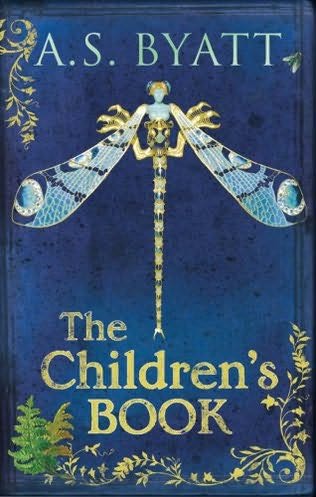 I am just pages away from the end of A. S. Byatt's latest novel The Children's Book . Technically, Byatt's writing skill has sustained my attention to multiple lines of plots both philosophical and domestic even while it has deepened my interest in the panoply of lives that are this book's characters. It has done so across several decades and all against the backdrop of the seismic shift taking place in the worlds of art and social ideas as England and Germany move inexorably toward World War I. The subject of this book is nothing smaller than the growing up of Europe.
I am just pages away from the end of A. S. Byatt's latest novel The Children's Book . Technically, Byatt's writing skill has sustained my attention to multiple lines of plots both philosophical and domestic even while it has deepened my interest in the panoply of lives that are this book's characters. It has done so across several decades and all against the backdrop of the seismic shift taking place in the worlds of art and social ideas as England and Germany move inexorably toward World War I. The subject of this book is nothing smaller than the growing up of Europe.A concomitant, but not consequent, backwards stare was the intense interest in, and nostalgia for, childhood. The men and women of the Golden Age, Hesiod wrote, lived in an eternal spring, for hundreds of years, always youthful, fed on acorns from a great oak, on wild fruits, on honey. In the Silver Age, which is less written about, the people lived for 100 years as children, without growing up, and then quite suddenly aged and died. The Fabians and the social scientists, writers and teachers saw, in a way earlier generations had not, that children were people, with identities and desires and intelligences. They saw that they were neither dolls, nor toys, nor miniature adults. They saw, many of them, that children needed freedom, needed not only to learn, and be good, but to play and be wild.
The greatness of Byatt's book Possession was in its synthesis of love story, mystery, literary scholarship and the social role of women. Even though there were two time periods and not a small cast of characters, it accomplished this with a tight focus on the search for a single manuscript and was, at the end of the day, great entertainment. The Children's Book, on the other hand, is vast by design. If its warp are the ideas: the waning of the great British Empire, the new art of Bloomsbury, James Barrie's Peter Pan, the rise of the Fabians, and a shift of social structures in a rising awareness of the subjugation of women and of the working classes, then its weft is the lives of an author of modern fairy tales, the director of the Victoria and Albert Museum, a German Puppeteer, a great potter, and even more importantly the lives of their children. Their weaving together is nothing short of a feat and yet somehow, this reader was never able to be subsumed by the narrative. I was not disappointed in the quality or drive of the writing - the plot was rich and the backdrop both familiar in subject matter and unfamiliar in presentation - I was just never permitted to forget it. This work reminds me of some of Iris Murdoch's larger books (I am a great fan of her's) in its goal of this sort of massive synthesis, and yet Murdoch's best books succeed in entertaining the reader whereas with the reading of The Children's Book I am impressed, but left with the sense of a dour pall. This is appropriate, I suppose, as it heralds the encroachment of World War I and the end of childhood, as this book would have it. I admire this as a book of ideas, I will remember the characters and their stories, but I don't turn the last pages loving this book as a work of fiction. As I have a few pages yet to go, I may come to revise this a bit. Stay tuned.
















No comments:
Post a Comment